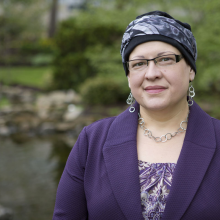Dr. Andrea Tapia, Associate Professor of Information Sciences and Technology at Penn State’s College of Information Sciences and Technology, will deliver the 2018 Opening Ceremony Keynote Address. The ceremony will be held on Tuesday, June 19 at the University of Pittsburgh’s School of Computing and Information. The 2018 i3 Opening Ceremony is open to the public and includes a banquet dinner. Registration is required to attend.
Register to attend the 2018 Opening Ceremony
Dr. Andrea Tapia
My expertise is social research methods and social theory, my training is in sociology, and I apply this expertise and training to the study of information and communication technologies (ICT) and their context of development, implementation and use. I am an elected leader in both of my home academic communities, the American Sociological Association and the International Association for Information Systems for Crisis Response and Management. My international reputation is visible in the following: organizing and leading two large and two small international workshops and conferences; $3.7 million in external funding that has resulted in 12 completed MS and PhD theses; 40 journals articles, 60 peer-reviewed conference proceedings, and 12 book chapters. I have been an invited speaker at 31 conferences or events and presented at 73 conferences. My teaching is showcased in the 12 different courses I have led for my College at the undergraduate, Honors and graduate levels. I have served as chair of 16 graduate student committees, 6 master’s theses and 10 Ph.D. dissertations. Seven of these ten Ph.D. students have already graduated and gone on to take jobs in the academe or industry. I have also served on 50 graduate student committees. I expect this trajectory to continue in the coming years.
is social research methods and social theory, my training is in sociology, and I apply this expertise and training to the study of information and communication technologies (ICT) and their context of development, implementation and use. I am an elected leader in both of my home academic communities, the American Sociological Association and the International Association for Information Systems for Crisis Response and Management. My international reputation is visible in the following: organizing and leading two large and two small international workshops and conferences; $3.7 million in external funding that has resulted in 12 completed MS and PhD theses; 40 journals articles, 60 peer-reviewed conference proceedings, and 12 book chapters. I have been an invited speaker at 31 conferences or events and presented at 73 conferences. My teaching is showcased in the 12 different courses I have led for my College at the undergraduate, Honors and graduate levels. I have served as chair of 16 graduate student committees, 6 master’s theses and 10 Ph.D. dissertations. Seven of these ten Ph.D. students have already graduated and gone on to take jobs in the academe or industry. I have also served on 50 graduate student committees. I expect this trajectory to continue in the coming years.
The contribution of my scholarship is carried forward through detailed studies of critical social problems in today’s world, with a specific focus on the take-up, uses, and effects of information and communication technologies relative to public social issues. The results of my work have contributed directly to the policy-making bodies of the United Nations, the Obama Administration, and the largest international relief and development organizations globally. All of my recent work investigates the great potential role that social media data might play in local community resilience, crowdsourced early warning systems, and the organized response to emergencies and disasters.
